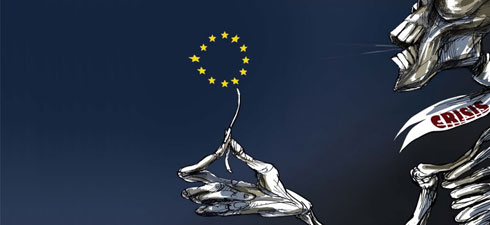If there is no political Europe, the euro will die.
This death could take many forms and there may be many detours along the way.
It could be an explosion, an implosion, a slow death, a dissolution, or a division.
It could take two, three, five, ten years, and be preceded by a large number of remissions, which, on each occasion, give the impression that the worst has been avoided.
The trigger event might be the collapse of Greece, bludgeoned by austerity plans that are impossible to implement and unbearable for the people, or it might be sparked by some court of Karlsruhe that will refuse, in the name of Germany, to take on the unlimited risk prompted by the default of a member state.
But it will die. One way or another, if nothing happens, it will die. This is no longer a hypothesis, a vague fear, a red rag waved in the face of recalcitrant Europeans. It is a certainty. And this certainty is not only a logical deduction (that takes account of the absurd chimera of an abstract single currency cut adrift from economies, resources, and common taxation if things stay as they are) but also a historical one (all the situations over the last two centuries that are reminiscent of the crisis we are currently experiencing).
For the euro is not the West’s first experiment with a single currency. There have been at least six such initiatives, and although, as always, the different situations are not comparable, a narrative of these experiments is rich in instruction.
Two of them clearly failed, and they failed for reasons ranging from national egotism to disparities in development between countries, which could not, without union, speak the same monetary language (and in the first of these cases, the key episode was a default by none other than... Greece!). These two long-forgotten initiatives were the Latin Monetary Union (1865-1927) and the Scandinavian Monetary Union (1873-1914).
Two quickly and clearly succeeded — and if in both instances they succeeded, it was because the process of monetary union was accompanied by political union. This was the case of the Swiss franc, which, with the adoption of the 1848 constitution that founded the Swiss Confederation after half a century of hemming and hawing over the political price of economic union, replaced the different currencies until then minted by Switzerland’s various cities, cantons and territories. And it was also the victorious lira that triumphed, at the moment of Italian unification, over a myriad of currencies indexed on the coinage of German states, on the French franc, on Italy’s duchies and ancient republics.
Having groped in the dark, having retreated, having nearly failed, two thus succeeded. Yes, two invented a veritable single currency, but only after a thousand crises, setbacks, temporary repeals; and thanks to courageous leaders, who understood that a currency can only exist if sustained by truly common policies on budgets, taxation, the allocation of resources, labour laws, and all of the rules of the social game.
This is the story of the German gold mark, which prevailed, almost 40 years after the Zollverein of 1834, over the florins, thalers, Kronenthalers and other marks of the Hanseatic cities; and it is also the story of the dollar, which — and we cannot say this enough — took 120 years to establish itself, and only truly came of age when it was decided to federalise the debt of the individual states of the Union.
The theorem is ineluctable.
Without federation, no single currency.
Without political unity, the currency will last for a few decades, and then, in the event of a war or a crisis, will crumble.
Without progress, in other words, towards the political integration identified as an obligation in every European treaty, but which no political leader, whether in France or Germany, appears to take seriously; without the surrender of competencies by nation states and an outright defeat of the "sovereigntists" who in reality are pushing peoples towards isolation and disaster, the euro will fall apart just as surely as the dollar would have done if the Confederate forces, for example, had won the American Civil War.
In days gone by, people used to say socialism or barbarism.
Today we must say: political union or barbarism.
Or better still: federalism or fragmentation — and with fragmentation, social regression, job insecurity, massive unemployment and poverty.
Or better still: Europe will either achieve the political integration without which no common currency has ever endured, or it will step out of history and sink into chaos.
We no longer have a choice: it is either political union or death.
All the rest — the ritual incantations of some, the short-term deals of the other, the solidarity fund thingy and stabilisation bank gizmo — will only serve to delay the moment of truth and prolong the illusion that the dying patient can still recover.
Was this article useful? If so we are delighted!
It is freely available because we believe that the right to free and independent information is essential for democracy. But this right is not guaranteed forever, and independence comes at a cost. We need your support in order to continue publishing independent, multilingual news for all Europeans.
Discover our subscription offers and their exclusive benefits and become a member of our community now!












